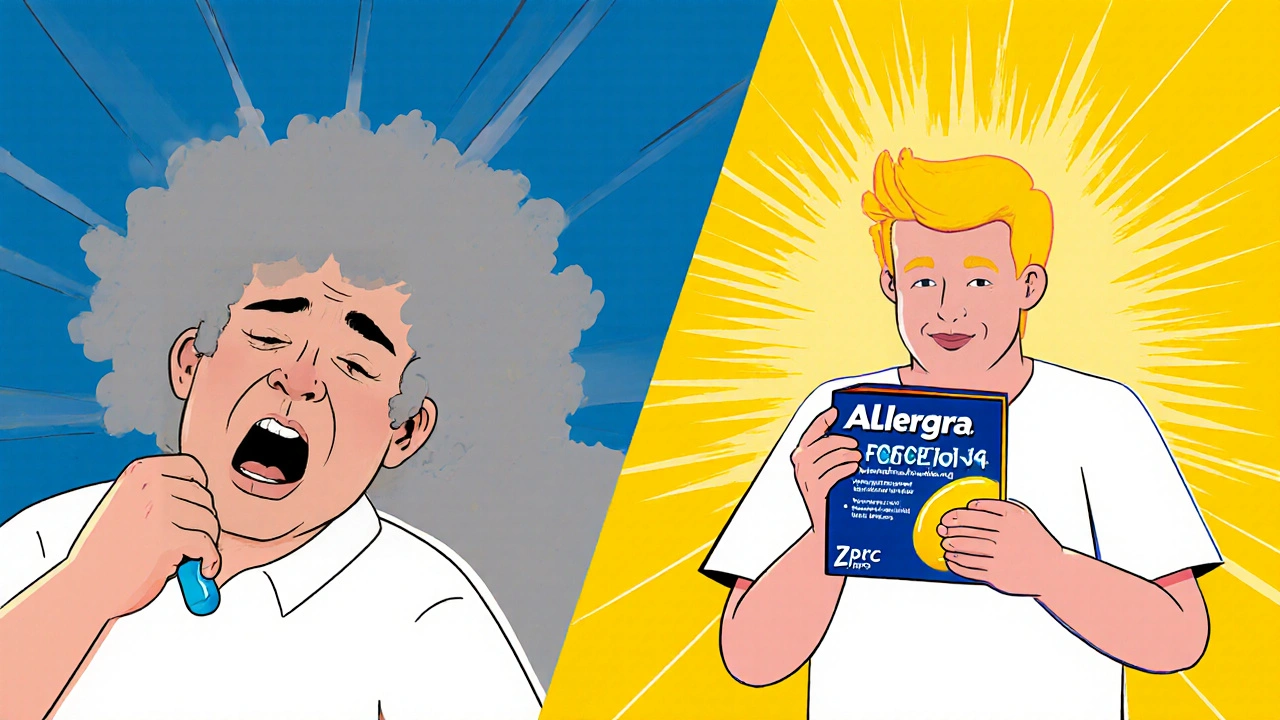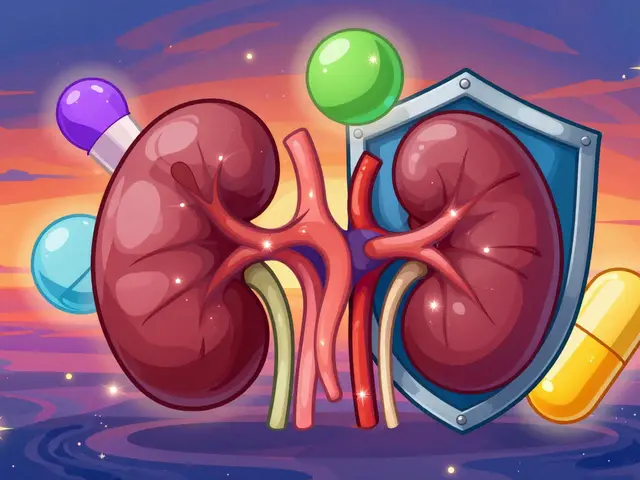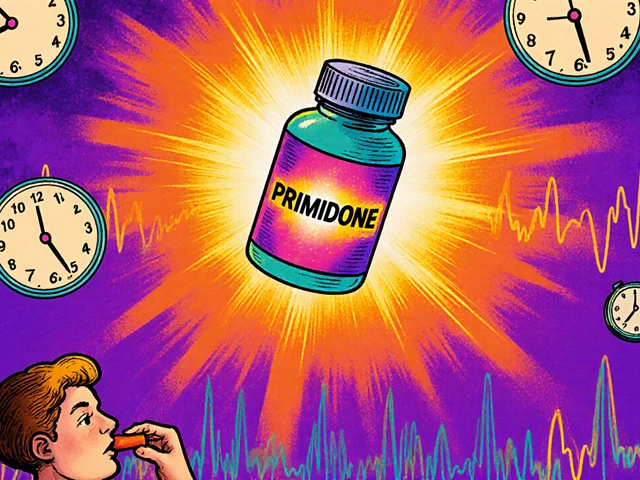If you’ve ever felt like your nose is running nonstop, your eyes are itching, or you’re sneezing every time you step outside, you know how frustrating allergies can be. Allegra (fexofenadine) is one of the go-to options for many people in the UK, but is it really the best choice for you? With so many other antihistamines on the shelf, it’s easy to feel overwhelmed. Let’s cut through the noise and compare Allegra directly with its most common alternatives-what each one does, how fast it works, what side effects to expect, and who it’s actually best for.
What Allegra (Fexofenadine) Actually Does
Allegra is the brand name for fexofenadine, a second-generation antihistamine. That means it blocks histamine, the chemical your body releases during an allergic reaction, without crossing the blood-brain barrier as easily as older drugs. This is why most people don’t feel drowsy taking it-unlike older antihistamines like chlorpheniramine or diphenhydramine.
In the UK, Allegra is available over-the-counter in 120mg and 180mg tablets, taken once daily. It starts working within about an hour and lasts up to 24 hours. It’s approved for seasonal allergic rhinitis (hay fever) and chronic urticaria (hives). The NHS lists it as a preferred option for people who need to stay alert-think drivers, machine operators, or anyone working in safety-critical jobs.
But here’s the thing: Allegra isn’t magic. It doesn’t reduce nasal congestion on its own. If your nose is completely blocked, you’ll likely need a decongestant like pseudoephedrine added in. That’s why some people end up switching.
Allegra vs. Cetirizine (Zyrtec)
Cetirizine, sold as Zyrtec in the UK, is probably the most common alternative to Allegra. Both are non-drowsy antihistamines, but they’re not the same.
Studies show cetirizine works slightly faster-some people feel relief in 20 to 30 minutes, compared to Allegra’s hour. It also tends to be a bit stronger in reducing sneezing and runny nose. But here’s the trade-off: about 10-15% of people report mild drowsiness with cetirizine, especially at the start. That’s not everyone, but it’s enough to make a difference if you’re working, studying, or driving.
Allegra, on the other hand, causes drowsiness in less than 2% of users. If you’ve tried Zyrtec and felt sluggish, Allegra might be your better bet. But if you need fast, strong relief and don’t mind a slight sleepy feeling, Zyrtec wins.
Allegra vs. Loratadine (Claritin)
Loratadine, sold as Claritin, is the third major player. It’s cheaper than both Allegra and Zyrtec, and it’s been around longer. Like Allegra, it’s marketed as non-drowsy, and most people tolerate it well.
But when you look at the data, loratadine is slightly less effective than fexofenadine for nasal symptoms, especially in moderate to severe hay fever. One 2023 review in the British Journal of Clinical Pharmacology found fexofenadine reduced sneezing and itching more consistently than loratadine across multiple trials.
Also, loratadine can be affected by grapefruit juice and some antibiotics, which might interfere with how your body processes it. Fexofenadine doesn’t have that issue. If you take other meds regularly, Allegra’s cleaner interaction profile makes it a safer choice.
Price-wise, loratadine is usually £3-£5 for a 30-day supply. Allegra costs around £8-£12. If you’re on a tight budget and your symptoms are mild, loratadine might be enough. But if you’ve tried it and still feel awful, upgrading to Allegra could be worth the extra cost.

Allegra vs. Desloratadine (Aerius)
Desloratadine is loratadine’s active metabolite-basically, it’s what loratadine turns into in your body after you take it. Aerius is the brand name, and it’s available in the UK as a prescription-only tablet or syrup.
It’s slightly more potent than loratadine and has a longer half-life, meaning it can last up to 28 hours. Some people find it more effective for persistent hives or year-round allergies. But it’s also more expensive than over-the-counter options, and you need a prescription.
Compared to Allegra, studies show they’re about equally effective. But desloratadine has a higher chance of causing dry mouth and headache. Allegra tends to have fewer side effects overall.
If you’ve tried everything else and still aren’t getting relief, your GP might suggest desloratadine. But for most people, Allegra gives you the same benefit without needing a prescription.
What About Nasal Sprays and Eye Drops?
Antihistamines like Allegra work systemically-they circulate in your blood. But sometimes, you need targeted relief. That’s where nasal sprays and eye drops come in.
Nasal sprays like fluticasone (Flixonase) or azelastine (Azelastine Nasal Spray) work directly in the nose. They’re slower to start-can take 3-5 days to build up-but they’re much better at reducing congestion than any oral antihistamine. Many people use Allegra + Flixonase together: one for overall itching and sneezing, the other for a blocked nose.
Eye drops like ketotifen (Zaditen) are great for itchy, watery eyes. If your eyes are your main problem, combining them with Allegra gives you full coverage. No need to rely on one pill to fix everything.
Who Should Avoid Allegra?
Allegra is safe for most adults and children over 12. But there are a few exceptions.
- If you have severe kidney disease, your doctor may lower your dose. Fexofenadine is cleared by the kidneys, so poor function can lead to buildup.
- Don’t take it with fruit juices like orange, apple, or grapefruit. They can block absorption and make it less effective. Take it with water only.
- Some antacids containing aluminum or magnesium can reduce Allegra’s effectiveness. If you take antacids, wait at least two hours after taking Allegra.
It’s also not recommended for children under 12 without medical advice. Pregnant or breastfeeding women should check with their GP-while studies show low risk, there’s not enough long-term data to say it’s completely risk-free.

Real-Life Scenarios: Which One Should You Pick?
Let’s say you’re a teacher with seasonal allergies. You need to stay alert all day, and your nose runs every spring. You tried loratadine, but your sneezing didn’t stop. Allegra might be your next step-it’s stronger, non-drowsy, and you can buy it without a prescription.
Or maybe you’re a student cramming for exams and your eyes are red and itchy. You’ve tried Zyrtec, but you felt tired. Allegra gives you the same allergy control without the brain fog.
What if you’re a parent with a 10-year-old who gets hives every time they eat peanuts? Allegra is approved for kids 6+ for hives, but you’ll need to check the correct dose. Your GP might suggest cetirizine syrup instead-it’s easier to measure for children.
And if you’re an older adult on multiple medications? Allegra’s low interaction risk makes it safer than loratadine or cetirizine, which can interact with common heart or blood pressure drugs.
When to Talk to Your GP
Most people can manage allergies with OTC antihistamines. But if you’re still struggling after 2-3 weeks of trying different options, it’s time to see your GP. You might have:
- Non-allergic rhinitis (triggered by weather, smoke, or strong smells)
- Chronic sinusitis
- An underlying condition like asthma or eczema
Your GP might suggest allergy testing, a nasal steroid spray, or even immunotherapy (allergy shots). Allegra isn’t the end of the road-it’s just one tool in the toolbox.
Final Take: What’s the Best Alternative to Allegra?
There’s no single ‘best’ antihistamine. It depends on your symptoms, your lifestyle, and your body’s response.
- For fastest relief with mild drowsiness: Cetirizine (Zyrtec)
- For lowest cost and mild symptoms: Loratadine (Claritin)
- For strongest non-drowsy relief: Allegra (Fexofenadine)
- For persistent hives or year-round allergies: Desloratadine (Aerius, prescription)
- For blocked nose: Add a nasal steroid spray like Flixonase
If you’re unsure, start with Allegra. It’s effective, safe, and doesn’t make you sleepy. If it doesn’t work well enough, try adding a nasal spray before switching antihistamines. Most people find their sweet spot with a combination-not just one pill.
Allergies don’t have to control your life. The right treatment exists. You just need to test what works for you.
Is Allegra better than Zyrtec for allergies?
Allegra and Zyrtec are both effective, but they work differently. Zyrtec (cetirizine) tends to work faster and may be stronger for sneezing and runny nose, but about 1 in 10 people feel drowsy. Allegra (fexofenadine) works slightly slower but causes drowsiness in fewer than 2% of users. If you need to stay alert, Allegra is usually the better choice.
Can I take Allegra every day?
Yes, Allegra is safe for daily use if you have ongoing allergies like hay fever or chronic hives. The standard dose is 120mg or 180mg once a day. Long-term use doesn’t lead to tolerance-you won’t need higher doses over time. Always follow the label or your doctor’s advice.
Why does fruit juice affect Allegra?
Orange, apple, and grapefruit juices contain compounds that block a transporter in your gut called OATP. This transporter helps fexofenadine get absorbed. If it’s blocked, up to 30% less medicine enters your bloodstream, making it less effective. Always take Allegra with plain water.
Is Allegra safe for kids?
Allegra is approved for children aged 6 and older for hives, and 12 and older for hay fever. Doses are lower for kids-usually 30mg or 60mg once daily depending on age and weight. Always check with a pharmacist or GP before giving it to a child.
Does Allegra help with congestion?
Not really. Allegra reduces sneezing, itching, and runny nose, but it doesn’t open up a blocked nose. For congestion, you’ll need a nasal decongestant like pseudoephedrine or a steroid spray like fluticasone. Many people use Allegra with a nasal spray for full relief.
Can I take Allegra with other allergy meds?
Yes, but carefully. You can combine Allegra with nasal sprays, eye drops, or antihistamine creams. Avoid combining it with other oral antihistamines like loratadine or cetirizine-they do the same thing and can increase side effects. Always check with your pharmacist if you’re unsure.
If you’ve tried Allegra and it didn’t work, don’t give up. Try adjusting your routine-add a nasal spray, switch to Zyrtec, or see your GP. Allergies are manageable. You just need the right combination for your body.





Dana Dolan
November 20, 2025 AT 02:05Allegra saved my spring. Tried Zyrtec once and felt like a zombie at my desk. Now I just take my 180mg with water (no juice, learned that the hard way) and I’m fine. Also, the nasal spray combo? Game changer.
Andy Feltus
November 22, 2025 AT 00:32So let me get this straight-we’ve turned allergy relief into a corporate-sponsored algorithm of pharmaceutical one-upmanship? Allegra’s ‘non-drowsy’? Sure, until you realize the FDA approved it because it didn’t make people fall asleep… unlike the other drugs that did. We’ve optimized for productivity, not wellbeing. We’re not treating allergies-we’re optimizing human output.
Meanwhile, the real solution? Stay indoors. Wear sunglasses. Don’t go outside in May. But hey, that’s not monetizable.
Dion Hetemi
November 23, 2025 AT 11:35LMAO at people acting like Allegra is some kind of miracle drug. You’re telling me someone’s gonna pay £12 for this when loratadine costs £4 and works ‘well enough’? If you’re still sneezing after loratadine, maybe your problem isn’t the med-it’s your house being a pollen factory. Clean your damn sheets. Wash your face after being outside. Stop treating your body like a broken vending machine.
Kara Binning
November 24, 2025 AT 05:39Okay but let’s be real-why are we even talking about this? In America, if you can’t afford the brand name, you’re just not trying hard enough. My cousin’s kid takes Allegra daily and she’s a straight-A student. Meanwhile, my neighbor’s son is on Zyrtec and he fell asleep in AP Bio. It’s not the medicine-it’s the attitude. You want to win at life? Take the good stuff. No excuses.
river weiss
November 26, 2025 AT 03:39It is important to note that fexofenadine, as a second-generation antihistamine, exhibits a pharmacokinetic profile characterized by minimal central nervous system penetration, which correlates with its low incidence of sedation. This distinguishes it from first-generation agents such as diphenhydramine, which readily cross the blood-brain barrier. Additionally, the absence of significant CYP450 enzyme inhibition renders it a favorable option for polypharmacy patients. However, concomitant ingestion of fruit juices, particularly those containing furanocoumarins, may inhibit the OATP1A2 transporter, thereby reducing bioavailability by up to 30%. Therefore, administration with water is not merely recommended-it is pharmacologically necessary.
Brian Rono
November 27, 2025 AT 01:26Everyone’s acting like Allegra is the chosen one, but let’s be honest: it’s just the one Big Pharma didn’t patent into oblivion. Cetirizine? More effective. Loratadine? Cheaper. Desloratadine? Stronger. But you know what’s *really* powerful? Not believing the marketing. You’re not special because you take Allegra-you’re just another sucker who read a blog that sounded like a drug rep’s PowerPoint. Stop idolizing pills. Your immune system isn’t broken. You’re just living in a sterile, pollen-saturated plastic bubble.
Ellen Calnan
November 27, 2025 AT 15:56I used to think allergies were just ‘bad luck’-until I started tracking my symptoms with a journal. Turns out, my worst days weren’t pollen-they were dust mites in my pillow. Allegra helped, sure, but the real win? Hypoallergenic covers, washing bedding in hot water, and a HEPA filter. No pill fixes a dirty environment. I used to feel hopeless. Now I feel like I’ve got control. You don’t need to be the strongest-you just need to be the most consistent.
And if you’re tired? Maybe it’s not the antihistamine. Maybe it’s your sleep. Maybe it’s your stress. Maybe it’s both. Don’t just pop pills-ask yourself why you’re still suffering.
Chuck Coffer
November 28, 2025 AT 07:11Wow. So you wrote a whole essay about which antihistamine makes you less sleepy… and you didn’t mention that half the people who take them don’t even have allergies? Probably just have a cold or anxiety. Or maybe they’re just bored and Googling ‘why do I sneeze so much’ at 2 a.m. while eating chips. We’ve turned normal bodily reactions into medical emergencies. What a time to be alive.
Marjorie Antoniou
November 30, 2025 AT 00:36I just want to say thank you for writing this. I’ve been struggling for years and felt so alone. I tried everything-Zyrtec made me drowsy, Claritin didn’t help, and I was scared to ask my doctor because I didn’t want to seem ‘needy.’ But reading this made me feel like it’s okay to keep trying. I’m going to talk to my GP about a nasal spray next week. You didn’t just give me info-you gave me hope.
Andrew Baggley
December 1, 2025 AT 05:54You got this. Seriously. I was in the same spot-sneezing through meetings, itchy eyes during Zoom calls, feeling like my life was on pause. Started with loratadine, switched to Allegra, added the nasal spray, and now I’m actually enjoying spring for the first time in years. It’s not magic. It’s trial and error. But you’re not broken. You’re just figuring it out. Keep going. The right combo is out there.
Frank Dahlmeyer
December 1, 2025 AT 13:50Let me tell you, I’ve been dealing with seasonal allergies since I was a kid in the ’80s-back when the only options were Benadryl and hoping for the best. I’ve tried them all: Claritin, Zyrtec, Allegra, Aerius, even the old-school cromolyn sodium sprays. I’ve got a whole drawer full of boxes. Here’s what I’ve learned: it’s not about finding the ‘best’ one-it’s about finding the one that lets you live your life. For me? Allegra + Flixonase. Every day. No shame. No guilt. I don’t care if it costs £12-I care that I can breathe. And if you’re still on the fence? Try it for two weeks. Don’t just read about it-live it. Your nose will thank you.
Codie Wagers
December 2, 2025 AT 01:39Everyone’s so obsessed with comparing antihistamines like they’re sports cars. But here’s the uncomfortable truth: you’re not allergic to pollen. You’re allergic to modern life. Clean air? No. Natural rhythms? No. Real food? No. We’ve destroyed our microbiomes with antibiotics, processed food, and antibacterial soap. Now we’re medicating the symptoms of our own collapse. Allegra doesn’t fix the problem-it just lets you keep living in the same broken system. Congratulations. You’re not managing allergies-you’re managing capitalism.